Power Consumption
Idle power consumption on 120V power we saw just over 13W idle for the six-core units. We generally assume these nodes will use 9-12W idle so this is in a reasonable range.
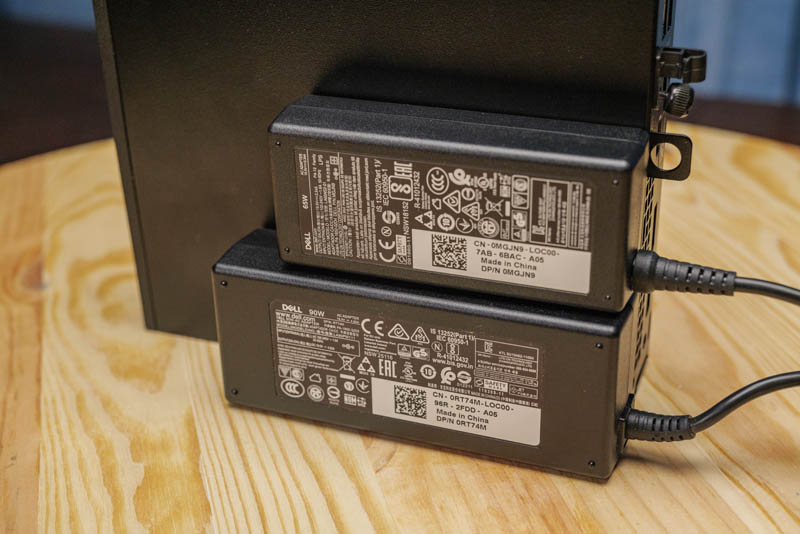
The power supplies are 90W Dell power adapters from the company’s notebook line. This is a big change. The traditional PSU pairing with a 35W TDP CPU for Dell as well as Lenovo and HP has been a 65W power adapter. We plugged the 65W power adapter we originally received with the unit and saw that the Dell firmware was giving us an error at boot. When we plugged in the 90W power adapter, it worked without giving us the warning message.
This somewhat makes sense. In a system like this with many powered high-speed USB ports, Dell needs to use a larger power supply to ensure peripherals get the power they need. As we expected, we also saw power consumption of the system creep over 60W without fully loading the USB ports so it seems as though this change was warranted. It is something to validate that you are getting a 90W power supply with this unit.
Since these are so low power, they are basically inaudible from 1m at idle, but one can hear the fans spin under load. That is impacted by dust accumulated in the system. These are meant to be desktops for office environments so they are generally very quiet.
Next, we are going to discuss key lessons learned before getting to our final thoughts.
Key Lesson Learned for TMM
In this series, we wanted to also focus on some key lessons learned. Since we have already tested well over a dozen different models, we are taking away key pieces of advice from each that we wanted to share.
Our first takeaway was finding that the 64GB RAM configuration indeed worked. We heard some forum members test this using G.Skill brand memory, but we tried with standard Samsung units and the system detected them and worked perfectly even though this is not a supported configuration.
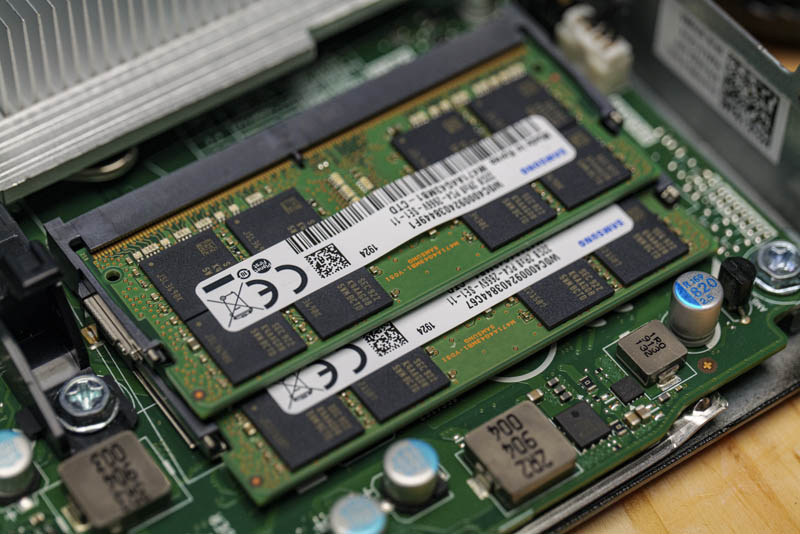
With a Core i7-9700T, this would be a great pairing. For our Core i5-9500T, 32GB seems more reasonable.
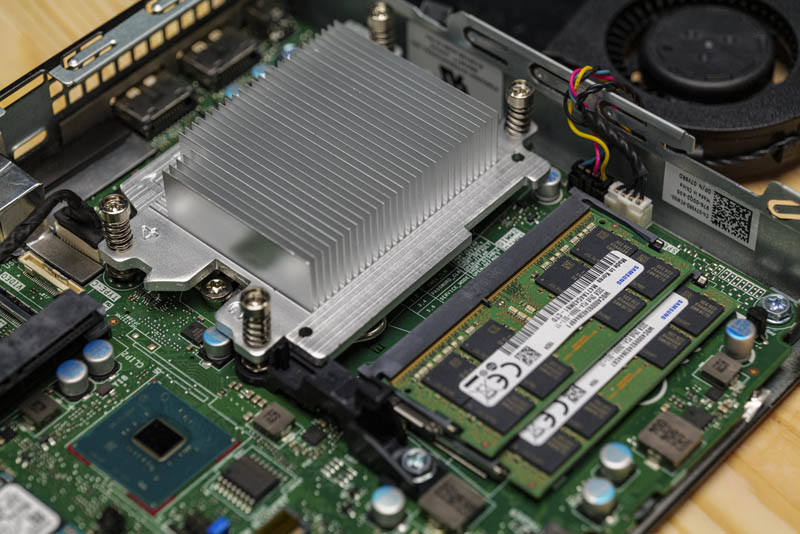
Our other key takeaway is to look for larger power bricks with newer systems. A side implication of this is that the higher 65W TDP units now utilize 130W power bricks. In either case, the PSU bump will add some cost to the units. It is needed to power all of the USB peripherals. Frankly, we are more than willing to use more power to get the higher levels of connectivity found on the OptiPlex 7070 Micro versus the 3070 Micro.
Final Words
Something is clear when working on this system. Dell has an excellent mechanical design. If we compare the service time of a component such as the 2.5″ hard drive or the M.2 NVMe SSD / WiFi module below that 2.5″ drive on the OptiPlex 7070 Micro versus older generation systems/ systems from other vendors such as Lenovo and HP, Dell has a great design. We will give an honorable mention to the Lenovo Tiny systems that have memory and M.2 storage underneath the system, but the M.2 WiFi card and 2.5″ drive servicing are not as good as what Dell is offering.
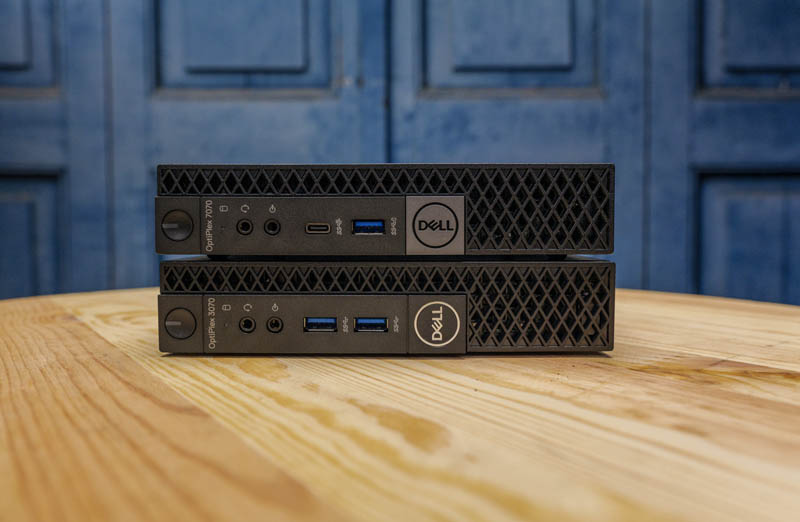
Compared to the OptiPlex 3070 Micro, there are huge changes beyond the processors. The ability to support 10Gbps USB devices opens a world of storage and networking possibilities. Also, having a Type-C port to connect a phone is nice to have. We get a better NIC along with the ability to use Intel vPro management as well. One other small touch is that the logo rotates on the OptiPlex 7070 Micro. If you see the above, the 3070 Micro has a static Dell logo. The 7070 Micro we rotated to match the orientation of the systems. That exemplifies the difference between these two systems. They may look similar at first glance, but the OptiPlex 7070 Micro is simply an all-around better system. It costs more, but there are a number of incremental improvements that justify the product segmentation.
We wish we purchased the unit with WiFi. Adding it after is not difficult, but adds time on each machine. Our advice is to look for a unit that has built-in WiFi capabilities.
Overall, the Dell OptiPlex 7070 Micro is an awesome Project TinyMiniMicro node and has become one of our favorites in the ~1L system category.

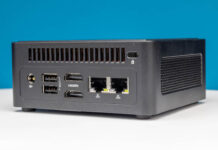
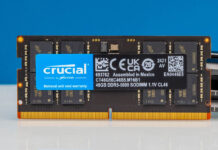
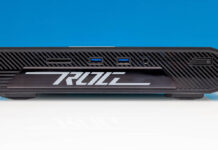
I find it interesting that the system wouldn’t boot with the 60W power supply. Is this because the voltage actually dropped below acceptable levels during the boot or because there is some sort of inkjet-printer-cartridge-like cryptographic coding going on to make sure only the correct Dell power supplies are used?
speedbal – Coming.
Eric – It boots, but it initially throws a stop and says it will run in lower performance mode.
Over priced and under powered. Much cheaper to build a mini amd machine. I also notice you didnt throw any real ryzens into your comparisons. Also, pushing this machine makes me question your integrity.
dorian they’re doing this as a series and did two Ryzen 2200GE systems from Lenovo and HP already. It’s like one a week. You aren’t going to build a silent Ryzen PC this size for this price. That’s the point of the series. We have 1000s of these at work. They’re great
Just grabbed 4 of these off eBay because you tested it with 64GB… Just what I needed!!!! Thanks!
Nate77 what kind of industry uses 1000s of these?
These systems are great, but have one huge shortcoming: no HHHL PCIe slot in place of the obsolete hdd slot. I’m sure it’s doable with a small fan at the very bottom.
Also: why can you put one or two M.2 NVMe drives, pulling up to 6/7W but not a 10Gbit ethernet with about the same TDP?
Hello, I think you are mistaken about the 8C/16T spec, the i7-9700T spec says no HyperThreading and thus only 8 cores / 8 threads.
It still seems a great spec for my mini desktop PC needs. Since the SSD is cheap and low-capacity I guess I’ll buy one separately. Thanks for the review. I’m expecting the SATA HDD to be higher-end since it’s from the small business Optiplex line.
I’ve been following your guides to mini/micro system. I ended up getting an inexpensive Optiplex 5050 with the i5-7600T processor. I’m going to use this for home applications (no gaming).
Mine comes with a 2.5 SSD and I’m wondering if you can share your recommendation for a PCIe SSD? I’m guessing I need at least a 512gb drive. If would be nice to have it as the bootable drive. It’s hard to make heads or tails from many of the manufacturer’s site.
Thank you
Hey Patrick,
I have an Optiplex 7070 micro with me and I am thinking to upgrade the machine by adding a graphics card. As it is a micro PC, I am not sure which graphics card will fit in or be compatible with the machine. Can you please suggest me a graphics card that goes with the Optiplex 7070 micro and also tell me the power supply requirements for the PC with a graphics card?
You cannot add a dedicated graphics card with most of these micro PCs. The only micro PC off my head that can add a very limited range of dedicated graphics cards is the Lenovo P320 ThinkStation series !